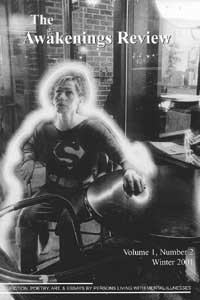Mental illness meets creativity in new journal of literary arts
By Laurie DavisNews Office
 |
A mind that possesses great artistic ability often suffers from great mental anguish, as well. This was a finding in a study of well-known visual and literary artists, and it was a result that Robert Lundin applied to contemporary artists who have lived with mental illness.
Lundin, Publications Manager for the University’s Center for Psychiatric Rehabilitation, was inspired by the research and subsequent book by Kay Redfield Jamison of Johns Hopkins University. In her book, Touched with Fire, Manic-depressive Illness and the Artistic Temperament, Jamison analyzed the mental suffering of such historic artists, composers, poets and authors as Vincent van Gogh, Robert Schumann, George Gordon, Lord Byron and Virginia Woolf.
All of these artists had been recognized for their talent, but they also had been institutionalized for mental illness or had attempted or committed suicide. After studying the psychiatric histories of many artists, Jamison linked creative ability to mental illness, finding that most of the people she studied had suffered from probable major depression, manic-depressive disorder, or cyclothymia, a manic-depressive psychosis marked by alternating periods of excitement and activity with periods of depression and inactivity.
 Robert Lundin |
“That intrigued me,” said Lundin. “I thought, let’s see if this is true. Let’s see if we can find people with mental illness who have real artistic ability.” Lundin, who wanted to increase involvement in the National Alliance for the Mentally Ill of Illinois, found artists who were just as eager to promote their artwork as he was to boost participation in mental health advocacy.
Since 1997, Lundin has assisted artists who are consumers of mental health services by arranging exhibitions at galleries in Chicago and surrounding communities, and he has since founded The Awakenings Project to continue efforts to promote artists and earn them a place in artistic society.
Recently, Lundin began The Awakenings Review, a literary journal of fiction, poetry and essays by people living with mental illnesses. The Center for Psychiatric Rehabilitation’s Recovery Press has published two editions of the journal thus far, and it is becoming a place where the work of literary artists is gaining national exposure.
Having experienced success with the art shows, Lundin conceived The Awakenings Review when he and Patrick Corrigan, Professor in Psychiatry and Executive Director of the Center for Psychiatric Rehabilitation, were brainstorming ideas for additional publications for the press. “I had more interest in writing and literature, and I wanted to examine the literary dimension more,” Lundin said.
 Patrick Corrigan |
Corrigan directed Lundin to a friend at Poets and Writers Magazine to seek a pool of writers for the journal, which Corrigan considers to have national importance. “In this time of concern about empowerment of people with mental illness, The Awakenings Review embodies the very soul and vitality of those who have recovered from psychiatric disabilities,” said Corrigan.
Lundin found his writers and poets, who also are mental health services consumers, through a small classified advertisement placed in Poets and Writers Magazine. He said the ad began with “Seeking creative writers… ” but that the ending was the attention grabber. “Then I said, the University of Chicago, and that attracted a lot of people.”
Receiving five to 10 submissions daily, Lundin was nearly overwhelmed by the response and even more so by the quality of the work submitted. “These were people with expertise and experience in writing. Many had been very widely published in very fine publications,” he said.
Lundin said some of the writers submitting work explained that other publishers had rejected it based on the subject matter, which often deals with the psychosocial aspects of mental illness––the physiological dimensions and the social suffering and distress experienced because of their disorders. He said many of the writers have told him: “‘I use writing as a catharsis––what you’re doing is so valuable.’ It was an opportunity that they couldn’t find elsewhere to have their work about mental illness published.”
Lundin is sympathetic to these writers’ need for expression, and he is empathetic to their mental suffering. Lundin takes medications for schizoaffective disorder, a mental illness that involves both mood instability and psychotic episodes. “It was years before they found the right treatments and medications,” said Lundin, who began experiencing symptoms in 1979, while studying business management in graduate school at Vanderbilt University.
Lundin said what these writers have to say teaches lessons about humanity. “They give unique insight into mental illness. These are very gifted people. They have very fine minds; they have thought about mental illness seriously. These are people who can write very intelligently. You can study case studies until they’re coming out of your ears, but if you read these poems you gain real insight into the human condition.”
What readers will be awakened to in the review are words that speak of the pain, loss, fear and desperation of living with mental illness. Some of the words of these writers read like bare-bone confessions while others intertwine elegantly through passages of darkness and light.
The dark and disturbing quality of some of the selected poems and stories is simply the nature of mental illness, said Lundin. Members of the editorial board do not protect squeamish readers, and they often consider profanity part of the art form. The editorial board, which comprises people who are consumers of mental health services, conducts its selection process like that of any other literary journal. They publish writers of quality works, such as the following sonnet titled “Survival” by Laban Carrick Hill.
To lift your bony butt on the commode
Some years from now (I can’t say when),
To wag my bloated hand you-ward to hold
Your flaccid breast that fed our two children,
To know my aches and creaks and bones
and flesh
As I become that thing, diminished,
To watch the peonies with blood-like flush
Collapse this spring, and the next, the next,
the next.
Allegra, Singulair, Sythroid, Floxnase,
Albuterol, Flovent, Wellbutrin, Pro-
Zac, Prednisone: the only sustenance
That keeps this Easter egg from its malaise.
A body ought, you say, to be the foe
Of any move toward deliverance.
Laban Carrick Hill
The Awakenings Review,
Vol. 1, No. 2––Winter 2001
The first edition of The Awakenings Review only published the works by people who have suffered from mental illnesses.
“We broadened our scope just a little bit,” said Lundin, when they decided to include in the second edition works by family members who have experienced a loved one’s illness. “It’s a family disease,” said Lundin. “Recovery relies partly on family support.”
Financial support for the journal has been acquired with the help of David Korajcyzk, Director of Foundations in the Office of Development in the Medical Center. An anonymous donor supported the first edition, and a gift from the National Alliance for the Mentally Ill of Dupage County, Illinois, partly funded the second edition.
Still in its infancy, The Awakenings Review has a small press run of 1,000 copies. “We’re young and developing our market,” said Lundin. “We are focusing more locally, with more saturation in Chicago first, before doing anything national.”
Lundin said of The Awakenings Project: “At first, I wanted to show the world that people with mental illness are creative and can create things of beauty.” Now convinced he has revealed the artistic ability of a group of uniquely talented artists and writers, Lundin will work to advance The Awakenings Review to a level of recognition he finds deserving.
“I’d like to see it endowed to make it a permanent thing. And I want it to become a literary magazine that has credibility in the literary world.”
For more information about The Awakenings Review or to order a copy, phone (708) 614-2496. Copies of the review sell for $14 each, plus postage.
![[Chronicle]](/images/small-header.gif)